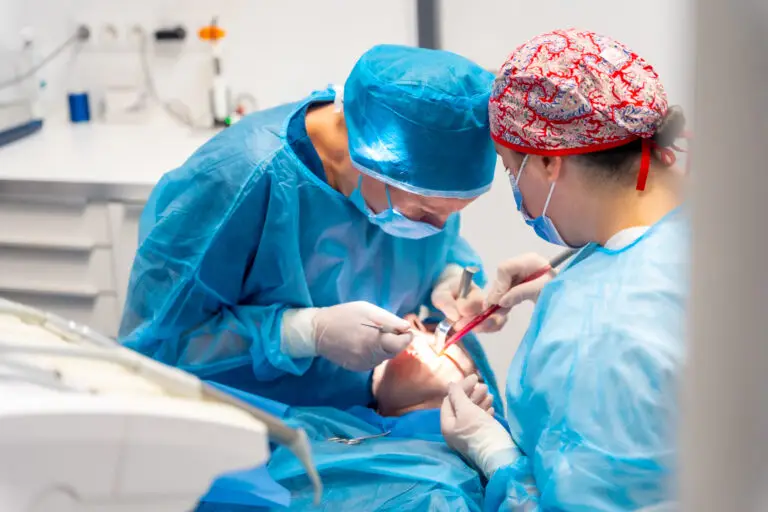Preparing For Dental Implants Surgery
How To Prepare For Dental Implant Surgery
More than 5 million dental implants are placed worldwide each year, with success rates of 90% and above. So, yes, dental implants are a popular and preferred way to replace missing teeth today. In that population, there’d hardly be one soul who’d deny feeling nervous and apprehensive before the procedure—or didn’t prepare for surgery.
For many patients, the waiting period before surgery is just as challenging as the procedure itself.

For Those Considering Dental Implants—Tips to Prepare for Dental Implant Surgery
Schedule a consultation with the dentist—the dentist will advise you on how to best prepare for surgery. Initial consultations with us are more of a friendly chat where we understand your needs, treatment goals and expectations, and time commitments. We examine your mouth and advise X-rays to assess if a dental implant is the best option for you.
Read science-backed data about dental implants: Reading is powerful, but you must verify the source. We offer blogs, articles and patient journeys that talk about the implant procedures, benefits of dental implants, aftercare, patient experiences, etc. These are authored and reviewed by implant dentists to help you get verified information.

For Those With a Scheduled Appointment—Tips to Prepare for Dental Implant Surgery
When it comes to any surgical treatment — especially one involving your smile — a little planning goes a long way. Understanding what to expect before, during, and after the procedure can significantly reduce stress and help you feel more in control of your decision. From lifestyle adjustments and medical preparations to mental readiness and practical planning, every step contributes to a smoother experience.
2 Weeks Before Implant Surgery
- Get all the information in place: Revisit your dentist’s prescriptions. If something’s unclear, ask questions. See if you have missed out on any particular tests, advice or report reviews. Recheck your insurance claim papers, the insurance process and the payment options. Have all documents, whether digital or physical, organised and handy. Have a family member or friend review them if you feel unsure.
- Complete the pre-operative tests: These may include CBC (complete blood count), HbA1c (for sugar levels), etc. This way you have sufficient time to get the reports reviewed and documented by your implant dentist.
- Quit smoking and nicotine intake: Ideally, patients must be off smoking and nicotine patches for 6 weeks before the surgery. If not, you need to work closely with your dentist and general practitioner to make sure you do not use cigarettes or patches for at least two weeks before and a few months after surgery.
- You may be advised to stop certain supplements: These include hormone supplements, fish oil tablets, vitamin E tablets, and herbal supplements like garlic extracts, green tea extracts, etc. Some supplements may need adjustments only.
- Arrange help now: Find a family member or friend to accompany you to the dental clinic, understand all post-operative instructions and drive you to and from the clinic on the surgery day.
1 Week To Go for Implant Surgery
Here’s what preparing for dental implants just a week before looks like:
- Antibiotic prophylaxis: Start with the antibiotics as directed in the prescription. Certain health conditions, like those with replaced prosthetic heart valves, congenital heart conditions, history of infective endocarditis, transplants, prosthetic implants, joint replacements, secondary diabetes infections, history of gum infections, etc., need a precautionary course of antibiotics to prevent infections during the implant surgery.
- Cut back on alcohol intake: Alcohol slows the healing process and reacts with the medicines, anaesthesia and sedation techniques in implant surgeries. Cut back on alcohol starting now to prepare your body for implants.
- Avoid caffeine: Caffeine is dehydrating and can interfere with healing. Increase your water intake and limit coffee to 1–2 cups per day.
- Oral hygiene: Step up your brushing and flossing. A clean mouth promotes better healing.
- Shop for comfort: Have ice packs, over-the-counter painkillers, and a comfortable pillow ready.
- Clear your schedule: Avoid stressful activities or work deadlines after surgery. Give yourself downtime—it’s essential, not indulgent.
- Mentally prepare: Feeling nervous is normal. Breathe, meditate, or use any calming method that works for you. This is a step toward a healthier you.
- Stop certain medicines: Medicines such as ibuprofen, anti-inflammatory agents (Advil, Midol, etc.), and blood thinners like aspirin should be stopped 72 hours before surgery, unless otherwise directed by your doctor.
Implant Surgery is Tomorrow
Tips on preparing for dental implants a day before the surgery:
- Relax: Don’t cram in a workout or a last-minute cleaning spree. Keep your day light and stress-free.
- Last minute checks: Confirm the appointment time for tomorrow, ensure your transportation is ready, and keep all your medical records handy.
- Meal prep: You might feel too tired to cook food after surgery; hence, prep your meals now. It is advisable to be on soft foods at room temperature for a few days after surgery. You can chop the veggies, boil them and store them in the refrigerator. Make the apple sauce and smoothies and store them. Keep the chicken broth and minced meat handy for quick soup recipes in the coming days.
- Fast (if instructed): If sedation anaesthesia is involved, your dentist might ask you to fast for 8–12 hours. Stick to the rules—no midnight snacks and have an early dinner the day before!
- Sleep early: Get to bed early for a good night’s rest.
On the Morning of Implant Surgery
- Do not skip meals: If fasting was not instructed for you, have a moderately light and healthy meal 1–2 hours before the surgery.
- Hygiene is key: Brush your teeth but skip the mouthwash unless instructed otherwise.
- Wear comfortable clothes: Light-fitting clothes with short sleeves are preferred. Avoid jewellery, tight socks, contact lenses, and makeup like lipstick.
- Arrive early: Plan to arrive 10–15 minutes ahead of your appointment. You’ll feel more at ease if you’re not rushing.
- Discuss: Orient your family member to learn and understand the prescribed medications and aftercare instructions after the surgery. They must be able to relay all the advice reliably.
“Should I or shouldn’t I?” If that’s your current inner debate, there are a few things to do before you consider dental implants"
How To Prepare For Dental Implant Surgery: Key Takeaways
Preparing for dental implants doesn’t have to be scary when you’re armed with the right instructions. Planning ahead and keeping calm, together with the support system of Smile 24h Expert Clinics, can set you up for a smooth surgery and recovery.
At Smile 24h, we advocate for a ‘patient-first’ philosophy; this involves addressing all your enquiries about dental implants with diligence, clearing the fog around painful and scary implant surgeries, scheduling appointments to accommodate your preferences, and providing flexible payment options that make the procedure easy on your pocket.
From the early ‘thinking-about-it’ phase to the nitty-gritty of what to do in the morning of your surgery, our certified ZAGA Doctors have got your back… and your teeth!


Dr. Medha Gupta, a Prosthodontist & Implantologist with over six years of clinical experience, is also a Medical Communication Expert working with healthcare firms and solopreneurs in India, the EU, the USA, and Singapore. Her expertise lies in transcribing complex medical and dental information into words that resonate with the audience, our readers. As a healthcare business writer and reviewer, she boosts brand credibility for medical/dental practitioners and HealthTech firms by speaking the ‘founder’s mind’ across marketing and sales platforms.
Still have questions? Find your nearest specialist and discover how we can help improve your quality of life with expert care
Frequently Asked Questions (FAQs)
It's normal to feel nervous. Breathing exercises, meditation, or doing anything that helps you relax can reduce anxiety. Planning ahead and knowing what to expect helps boost confidence before surgery.
Avoid alcohol, caffeine, smoking, and certain medications like ibuprofen or blood thinners. Follow your dentist’s instructions carefully, especially regarding fasting if sedation is involved.etur adipiscing elit. Ut elit tellus, luctus nec ullamcorper mattis, pulvinar dapibus leo.
Common pre-operative tests include a complete blood count (CBC) and HbA1c to check blood sugar levels. These tests help ensure you're fit for surgery and allow your dentist to plan accordingly.
Yes, some supplements like vitamin E, fish oil, and herbal extracts (e.g., garlic or green tea) should be paused or adjusted before surgery. Always consult your dentist for personalized advice.
Confirm your appointment time, prep soft meals, stay relaxed, and get a good night's sleep. If you're undergoing sedation, follow your fasting instructions strictly.
Eat a light meal if fasting wasn't required, brush your teeth (no mouthwash unless told otherwise), wear comfortable clothes, and arrive early. Make sure your caregiver knows the aftercare instructions.
